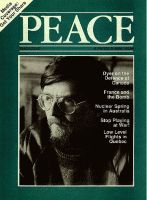
Peace Magazine Jun-Jul 1986, page 19. Some rights reserved.
Search for other articles by Anthony Bond here
Garry Davis, the gadfly world citizen, who for nearly 40 years has stymied the world's bureaucrats with his square-peg status, has a sure-fire prescription for world peace: world government. And he doesn't mean the United Nations.
Davis is not talking theory here; a benign world government is already functioning and is recognized by nation states representing nearly a quarter of the globe.
On September 4, 1953, at Ellsworth, Maine, he founded the World Government of World Citizens. Quixotic? Not if you recall the origins of the United States: A handful of citizens, in effect, simply declared themselves "Americans."
"I, a World Citizen, hereby claim the territory of the entire earth as the proper home and the rightful possession of all mankind," said Davis at Ellsworth. "As an actual symbol of that ownership, I claim here...the dot of land on which I now stand as World Territory...A point has no dimensions, however, and therefore no physical existence."
Herein lies the beautiful paradox of world government: It can claim the whole world, yet, at the same time, none of it. The eighteenth century nation state, on the other hand, invites conflict by claiming actual territory.
Even though physically he lives in the United States, legally Davis doesn't exist. He is considered by the U.S. Government to be both an "excludable alien" and a "stateless person," categories that cancel each other out. The U.S. would love to deport him, but to where?
In the course of travelling the world without a national passport and landing in jail thirty-two times as a result, Davis has discovered the one place where he does legally exist: on the line between countries.
In 1945, prescriptions for world peace were much sought after, with Churchill himself calling for "effective world super government." It was against this backdrop that, in 1948, twenty-six-year-old Garry Davis, Broadway actor-turned-bomber pilot, disillusioned by such insanities of war as jettisoning U.S. bombs on Allied villages, walked into the U.S. Embassy in Paris, renounced his U.S. citizenship, and declared himself a world citizen as a practical first step to ending war on the planet.
For the next two years Davis was world famous, lionized by the leading French intellectuals, and flooded with over 750,000 requests for "world citizenship" by people from a hundred countries.
Davis picked Paris because the new United Nations was located on territory declared international. However, the U.N. itself Davis had no time for. "It was merely a meeting-place for the representatives of some of the nation states," he said. Just after he took world citizenship, the U.N. issued the idealistic Universal Declaration of Human Rights (UDHR).
his was tailor-made for Davis and he eagerly adopted it as his world citizens' credo, for, among its 30 Articles, it stated that the will of the people shall be the basis of government authority and that everyone has the right to travel and to change nationalities.
After Paris began Davis's frustrating and often hilarious experiences, documented in his book, My Country is the World, of travelling without a passport, and often going to jail for it. During his sixteenth incarceration, he hit upon the idea of issuing himself his own world passport.
o, in 1954, he established the World Service Authority, the administrative arm of the World Government of World Citizens, and did just that.
This world passport, which cites backing by Article 13(2) of the UDHR (that "Everyone has the right to leave any country, including his own, and to return to his own country") certainly looked official, with admonitions in six languages such as, "Not valid unless signed by the bearer." Today, 91 countries have accepted it on a case-by-case basis and six, including the People's Republic of China, have formally recognized it.
The WSA fills a crying need by providing documents of last resort to the world's 20 million refugees and stateless persons--over 90,000 passports and 160,000 world I.D. cards, world birth certificates, world marriage licenses and even world money (redeemable at the National Bank of Washington). "The refugee is merely the most immediate victim, other than war wounded, of an ungoverned world," says Davis.
As well, Davis's unique status allows him to help people in completely original ways. In 1975, the British writer Dennis Hills was under sentence of death from Idi Amin. Even the Queen could not sway the Ugandan leader. Yet a telex from Davis's World Court of Human Rights invoking World Habeas Corpus resulted in Hills's release in 48 hours.
n earlier example was the case of U.S. draftee Fred Haas, who wanted to register as a conscientious objector on philosophical grounds--a category not recognized by the draft board. Davis wrote U.N. Secretary General Hammarskjold, President Eisenhower, and the Chairman of Haas's draft board that "as a citizen of World Government, Haas was applying for entry into the Sovereign Order of World Guards to be trained as a peacemaker, mandated by the UDHR under a regime of world law."
Apart from the standard induction order, there was silence from the Pentagon. When Davis made discreet enquiries, he discovered that the Pentagon had dropped the Haas case like a hot potato. They were afraid that if they prosecuted, Haas might use as his defence the Ninth Amendment of the U.S. Constitution, known to constitutional lawyers as the "sleeping giant," which refers to unspecified rights "retained by the people."
World government is now being put forth again as an urgent need. Garry Davis, a prophet and a man perhaps a hundred years ahead of his time, comments, "We're living in a global village, whether we like it or not."

Peace Magazine Jun-Jul 1986, page 19. Some rights reserved.
Search for other articles by Anthony Bond here